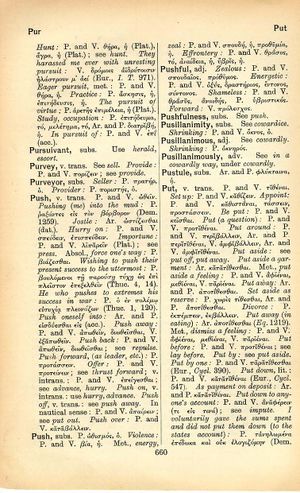put
Ὕβρις κακὸν μέγιστον ἀνθρώποις ἔφυ → Malum est hominibus maximum insolentia → Das größte Übel ist für Menschen Übermut
English > Greek (Woodhouse)
v. trans.
P. and V. τιθέναι. Setup: P. and V. καθίζειν. Appoint: P. and V. καθιστάναι, τάσσειν, προστάσσειν. Be put: P. and V. κεῖσθαι. Put (a question): P. and V. προτιθέναι. Put around: P. and V. περιβάλλειν, Ar. and P περιτιθέναι, V. ἀμφιβάλλειν, Ar. and V. ἀμφιτιθέναι. Put aside: see put off, put away. Put aside a garment: Ar. κατατίθεσθαι. Met., put aside a feeling: P. and V. ἀφιέναι, μεθιέναι, V. παριέναι. Put away: Ar. and P. ἀποτίθεσθαι. Set aside as reserve: P. χωρὶς τίθεσθαι. Ar. and P. ἀποτίθεσθαι. Divorce: P. ἐκπέμπειν, ἐκβάλλειν. Put away (in eating): Ar. ἀποτίθεσθαι (Eq. 1219). Met., dismiss a feeling: P. and V. ἀφιέναι. μεθιέναι, V. παριέναι. Put before: P. and V. προτιθέναι; see lay before. Put by: see put aside. Put by one: P. and V. παρατίθεσθαι (Eur., Cycl. 390). Put down, lit.: P. and V. κατατιθέναι (Eur., Cycl. 547). As payment on deposit: Ar. and P. κατατιθέναι. Put down to anyone's account: P. and V. ἀναφέρειν (τι εἰς τινά); see impute. I volunlarily gave the sums spent and did not put them down (to the states account): P. τἀνηλωμένα ἐπέδωκα καὶ οὐκ ἐλογιζόμην (Dem. 264). Put an end to: P. and V. καθαιρεῖν, παύειν, λύειν, Ar. and P. καταπαύειν, καταλύειν. Help to put down: P. συγκαταλύειν (acc.) Subdue: P. and V. καταστρέφεσθαι, κατεργάζεσθαι. Put forth, germinate: P. and V. φύειν; see yield. Exert: P. and V. χρῆσθαι (dat.); see show. Put out to sea: see put out. Put forward as spokesman: P. προτάσσειν. Put forward for election: P. προβάλλειν (Dem. 276). Introduce: P. and V. ἐπάγειν, εἰσάγειν, εἰσφέρειν, προσφέρειν, προτιθέναι. Put forward as an excuse: P. and V. προβάλλειν (mid. also P.), προὔχεσθαι, προΐστασθαι (Eur., Cycl. 319), V. προτείνειν. Put in: P. and V. εἰστιθέναι, ἐντιθέναι, ἐμβάλλειν. Put in, introduce (evidence): P. ἐμβάλλειν. Put in the witness box: P. ἀναβιβάζειν (τινά). V. intrans. In nautical sense: P. and V. κατάγεσθαι, P. σχεῖν (2nd aor. of ἔχειν), καταίρειν, προσβάλλειν. Put in at: P. σχεῖν (dat. or πρός, acc.) (2nd aor. of ἔχειν), προσβάλλειν (dat. or πρός, acc. or εἰς, acc.), ναῦν κατάγειν (εἰς, acc.), προσίσχειν (dat.), προσμίσγειν (dat.), καταίρειν (εἰς, acc.), κατίσχειν (εἰς, acc.), P. and V. προσσχεῖν (2nd aor. προσέχειν) (dat. or εἰς acc., V. also acc., alone), κατάγεσθαι (εἰς, acc., V. acc. alone), V. κέλλειν (εἰς, acc., πρός, acc., ἐπί, acc., or acc. alone); see touch at. Whose puts in at this land: V. ὃς ἂν κατέλθῃ τήνδε γῆν (Eur., I.T. 39). Putting in at Malea: V. Μαλέᾳ προσίσχων πρῷραν (Eur., Or. 362). Put in mind: see remind. Put in practice: P. and V. χρῆσθαι (dat.). Put off (clothes): P. and V. ἐκδύεσθαι, Ar. and P. ἀποδύεσθαι. Postpone: P. and V. ἀναβάλλεσθαι (Eur., Alc. 526), εἰς αὖθις ἀποτίθεσθαι. If a man sins against you in any way you put off till another time your anger against him: κἂν ὁτιοῦν τις εἰς ὑμᾶς ἐξαμάρτῃ τούτῳ τὴν ὀργὴν εἰς τἆλλα ἔχετε (Dem. 259). Put out to sea: see put out. Evade: P. ἐκκρούειν, διακρούεσθαι; see evade. They put you off by saying he is not making war on the city: P. ἀναβάλλουσιν ὑμᾶς λέγοντες ὡς ἐκεῖνός γε οὐ πολεμεῖ τῇ πόλει (Dem. 114). I put them off, speaking them fair in word: V. ἐγὼ δὲ διαφέρω λόγοισι μυθεύουσα (Eur., H.F. 76). Put on: P. and V. ἐπιτιθέναι, προστιθέναι. Put on (clothes, etc.): P. and V. ἐνδύειν, περιβάλλειν, Ar. and P. ἀμφιεννύναι, V. ἀμφιβάλλειν, ἀμφιδύεσθαι, Ar. and V. ἀμφιτιθέναι, ἀμπίσχειν. Feign: Ar. and P. προσποιεῖσθαι. Put on, adj.: P. προσποιητός. Sham: P. and V. πλαστός (Xen.), V. ποιητός. Put out, cast out: P. and V. ἐκβάλλειν. Stretch out: P. and V. ἐκτείνειν, προτείνειν. Extinguish: P. and V. σβεννύναι (Thuc. 2, 77), ἀποσβεννύναι, κατασβεννύναι; see quench. Put out (the eyes): V. ἐκτρίβειν (Eur., Cycl. 475); see blind. Put out (at interest or on cuntract): P. ἐκδιδόναι. Put out of the way: P. and V. ὑπεξαιρεῖν, ἀφανίζειν, P. ἐκποδὼν ποιεῖσθαι. Annoy: P. and V. ὄχλον παρέχειν (dat.), Ar. and P. πράγματα παρέχειν (dat.), ἐνοχλεῖν (acc. or dat.), V. ὀχλεῖν. Disconcert: P. and V. ταράσσειν, ἐκπλήσσειν. Put out to sea: P. and V. ἀπαίρειν, ἀνάγεσθαι, ἐξανάγεσθαι, P. ἐπανάγεσθαι, ἀναγωγὴν ποιεῖσθαι, ἀναπλεῖν, αἴρειν. Put out (against an enemy): P. ἀντανάγεσθαι (absol.), ἀντανάγειν (absol.). Put out in advance: P. προανάγεσθαι. Put out secretly: P. ὑπεξανάγεσθαι. Put out with others: P. συνανάγεσθαι (absol.). Put over, set in command: P. and V. ἐφιστάναι (τινά τινι). Put round: see put around. Put to: see shut. Though hard put to it, he got round unobserved: P. χαλεπῶς τε καὶ μόλις περιελθὼν ἔλαθε (Thuc. 4, 36). Put to sea: see put out. Put together: P. and V. συντιθέναι. Put under: P. and V. ὑποβάλλειν (τί τινι) (Xen.). Put up (to auction): P. ἀποκηρύσσειν. Put up (a person to speak): P. ἐνιέναι (ἐνίημι) (Thuc. 6, 29). Put forward: P. προτάσσειν. Put a person up to a thing: use encourage, suggest. Put up (for the night): Ar. and P. καταλύειν. Put up (a house, etc.): P. καταλύειν (εἰς, acc.); see lodge. Put up with: P. and V. φέρειν, ἀνέχεσθαι, ὑπέχειν, ὑφίστασθαι; see endure. Acquiesce in: P. and V. στέργειν (acc. or dat.), P. ἀγαπᾶν (acc. or dat.), V. αἰνεῖν (acc.). Put upon: see put on. Met., oppress: P. and V. ἀδικεῖν, κακοῦν.

